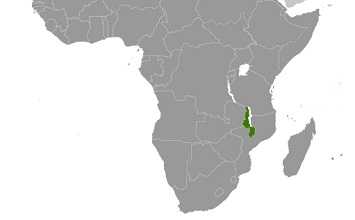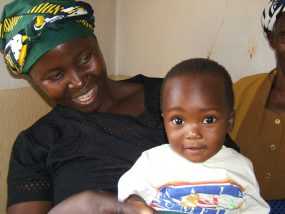
The Centers for Disease Control and Prevention (CDC) has been working in Malawi (CDC Malawi) since 2001. CDC Malawi, the U.S. Government and local and international partners help the Malawi Ministry of Health (MoH) achieve national public health goals in a variety of ways, including training health workers and providing technical and financial assistance to improve surveillance systems, medical informatics, monitoring and evaluation, laboratories, care and treatment, and prevention efforts throughout the country. Malawi is known for having one of the most innovative and efficient HIV programs in the world, and CDC Malawi is proud to be a key contributor to supporting Malawi to achieve an AIDS-free generation.


CDC Staff
8 U.S. Assignees
27 Locally Employed

At a Glance
Population: 17,174,00
Per capita income: US $780
Life expectancy at birth: W62/M60 yrs
Infant mortality rate: 1360/100,000 live births

Top 10 Causes of Death
- HIV/AIDS & TB
- Diarrheal diseases
- Cardiovascular diseases
- Neonatal disorders
- NTDs & malaria
- Neoplasms
- Unintentional injuries
- Nutritional deficiencies
- Other noncommunicable diseases
- Diabetes/urological/blood/ endocrine disorders
Source: Population Reference Bureau 2015: Malawi
Source: WHO Country Health Statistical Profiles 2015-Malawi
Impact on Malawi

As of end December 2015, 45.3% of patients on antiretroviral therapy (ART) nationally were being managed through the electronic medical record system (EMRS).
290 health care workers are expected to graduate from pre-service training institutions in 2016 (all nurse-midwives).
According to the validated MoH data, as of September 2015, there were 585,660 patients ‘Alive on ART’ which represented 59% of the estimated 1 million HIV positive population.
142,701 (91%) of 156,851 women at ANC had their HIV status confirmed. 129,887 (97%) of 133,931 women at maternity had their HIV status confirmed.
78% of adults and 79% of children were retained alive on ART at 12 months after initiation.
Program Highlights
In October 2015, Malawi officially launched the Malawi Population-Based HIV Impact Assessment (MPHIA). MPHIA is the first population based survey to assess national level incidence, population viral load and pediatric prevalence among other indicators in the country. The survey is targeting about 15,000 households.
With CDC support, Malawi’s newly launched Civil Registration Vital statistics System (CRVS) issued its first ever birth certificate in August, 2015.
CDC Malawi’s flagship Field Epidemiology Training Program (FETP) was launched on 18th April 2016 under the leadership of the Public Health Institute of Malawi (PHIM) initially enrolling ten residents into a four month frontline FETP course.
HIV/AIDS and TB
CDC Malawi provides technical assistance and programmatic support to the MOH Department of HIV and AIDS which oversees and actively manages Malawi’s HIV response efforts. CDC also provides direct support to service delivery through implementing partners to improve the quality of care and meet the goals of the National Strategic plan for HIV and TB: Through the U.S. President’s Emergency Plan for AIDS Relief (PEPFAR), CDC Malawi helps to:
- Support the implementation of universal eligibility for antiretroviral treatment (Test and Start)
- Scale up comprehensive HIV services across a continuum of care, from prevention to treatment to meet the 90-90-90 goals for adults and children living with HIV;
- Enhance access to and coordination of adult and pediatric HIV care and treatment;
- Expand the range and quality of services for preventing mother-to-child transmission (PMTCT) and improve the cascades of care for women on Option B+ and HIV exposed infants;
- Strengthen integrated TB/HIV services;
- Support the expansion of a voluntary, low-risk blood donor pool nationally;
- Implement diversified models of HIV testing and differentiated care models for treatment
- Provide voluntary medical male circumcision (VMMC) services
Health Systems Improvements
CDC Malawi supports the strengthening of professional training colleges for nurse-midwives and other healthcare professionals, and has provided scholarships that result in more than 500 new healthcare workers graduating from public and Christian Health Association of Malawi (CHAM) training colleges.
With CDC support, the Malawi MOH and partners are improving health facility efficiency and healthcare quality throughout the country by developing and maintaining national Electronic Medical Record systems (EMRs), a Demographic Data Exchange (DDE) system and a national HIV surveillance system and surveys.
CDC also supports strengthening of laboratory services by supporting in-service and pre-service training; institutionalizing quality assurance and quality control protocols, careful supervision, and management; and integrating overall laboratory diagnostics.
Malaria
As a partner in the President’s Malaria Initiative (PMI) with USAID, CDC Malawi provides technical support for Malawi’s primary malaria prevention and control efforts. This support emphasizes increasing coverage and use of long-lasting insecticide treated bed nets, improving uptake of intermittent preventive treatment of malaria in pregnancy (IPTp), strengthening malaria case management, and improving surveillance, monitoring and evaluation systems. Through a cooperative agreement with the Malawi College of Medicine’s Malaria Alert Centre, CDC implements PMI-funded operational research activities and entomological monitoring to guide malaria programmatic decision-making. Recent and current operational studies include the evaluation of efficacy of first- and second-line antimalarials, assessment of the impact of IPTp on birth outcomes, evaluation of cell phone messages to improve health worker management of malaria, and a randomized trial to assess the efficacy of an alternative medication for IPTp.
CDC’s Implementing Partners in Malawi
Leadership, Policy, and National Oversight: National Aids Commission (NAC)
Service Delivery: Christian Health Association of Malawi (CHAM), Lighthouse Trust, Management Sciences for Health (MSH), Elizabeth Glaser Pediatric AIDS Foundation (EGPAF)
System Strengthening: Malawi Blood Transfusion Service (MBTS), Baobab Health Trust (BHT), University Research Co. LLC. (URC), National Registration Bureau (NRB), College of Medicine Malaria Alert Centre
Human Resources for Health: Malawi College of Medicine (COM); Christian Health Association of Malawi (CHAM); International Training and Education Center for Health (ITECH) – University of Washington, Malawi College of Medicine, ICAP-Columbia University
For more country information
CDC Malawi, Dr. Andrew Auld, Country Director
Telephone: +265 884 664 257
Email: ggv4@cdc.gov www.cdc.gov/globalhealth/countries/malawi
Recent Blogs
-
Malawi’s Approach to Treating Pregnant Women With HIV Shows Success
Malawi is a place where good news can be hard to find, especially when the topic is improving people’s health…
February 25, 2016
- Page last reviewed: August 25, 2017
- Page last updated: August 25, 2017
- Content source:
Global Health
Notice: Linking to a non-federal site does not constitute an endorsement by HHS, CDC or any of its employees of the sponsors or the information and products presented on the site.



 ShareCompartir
ShareCompartir